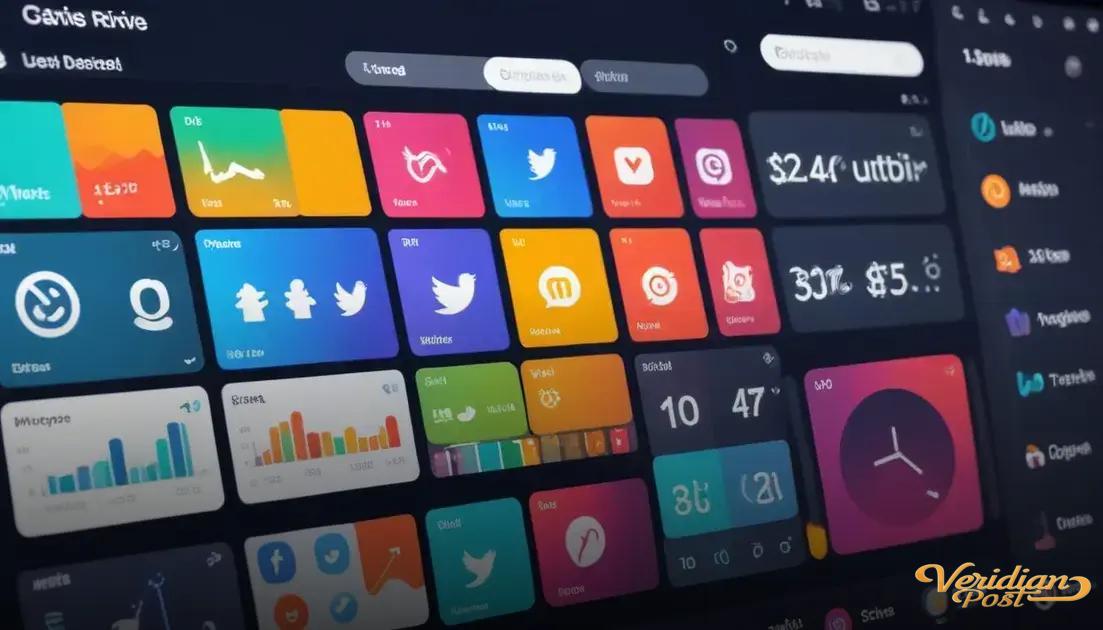Small business accounting tips include using proper software, maintaining accurate records, separating personal and business finances, and regularly reviewing budgets and expenses to ensure financial health and compliance.
Small business accounting tips can make a significant difference in your company’s success. Have you ever felt overwhelmed by numbers or paperwork? You’re not alone! Understanding essential accounting practices can help you manage your finances more effectively.
Understanding basic accounting principles
Understanding basic accounting principles is crucial for any small business owner. These principles help you keep track of your finances and make informed decisions. First, familiarize yourself with the key elements, including assets, liabilities, and equity.
What Are Assets?
Assets are resources owned by your business. This includes cash, inventory, property, and equipment. Keeping track of your assets is vital for assessing your company’s value.
What Are Liabilities?
Liabilities, on the other hand, are what your business owes. This can include loans, accounts payable, and any other debts. Understanding liabilities helps you manage your debt levels effectively.
Equity Explained
Equity represents the owner’s interest in the company after all liabilities have been deducted from assets. A positive equity indicates that your business has a solid financial foundation.
Another important principle is the accounting equation: Assets = Liabilities + Equity. This equation forms the basis of double-entry bookkeeping, ensuring that your financial records are balanced.
Why Bookkeeping Matters
Maintaining accurate bookkeeping records helps you track financial performance and prepare for tax obligations. Each transaction should be documented, which can simplify the budgeting process and aid in financial analysis.
When you understand these basic accounting principles, you can gain better control over your business’s financial health and plan for future growth.
Choosing the right accounting software
Choosing the right accounting software is essential for streamlining your small business finances. With various options available, it’s important to consider your specific needs and features that will best support your operations.
Identify Your Business Needs
Start by assessing what your business requires. Do you need basic bookkeeping or advanced features like invoicing, payroll, and tax management? Understanding your priorities will help you narrow down options.
Ease of Use
Look for software that is user-friendly, especially if you’re not tech-savvy. A clean interface and intuitive navigation can save you time and frustration. Many providers offer free trials, allowing you to test the software before committing.
Integration Capabilities
Choose software that can integrate with other tools you use, such as e-commerce platforms or CRM systems. This seamless interaction can enhance efficiency and reduce manual data entry, leading to fewer errors.
Customer Support and Resources
Reliable customer support is crucial, especially when you encounter issues. Check reviews and support options like live chat, email, or phone assistance. Additionally, consider the availability of educational resources, such as tutorials or forums.
Cost Considerations
Finally, consider the pricing structure. Some software requires monthly subscriptions, while others have a one-time fee. Ensure that you choose a solution that fits your budget while providing the necessary features.
How to keep track of expenses effectively
Keeping track of expenses effectively is vital for maintaining a healthy financial situation in your small business. Tracking expenses not only helps you understand where your money goes but also aids in managing budgets and preparing for taxes.
Use Accounting Software
Utilizing accounting software can simplify the process of tracking expenses. Many platforms allow you to link your bank accounts and automatically categorize transactions, saving you time and reducing errors.
Organize Receipts
Make it a habit to keep your receipts organized. You can use apps or simply have a dedicated folder to store them. Digitizing receipts with your smartphone can help keep them safe and make retrieval easier during tax season.
Create an Expense Report
Regularly generating an expense report can give you a clear picture of your spending. This can help identify trends and areas where you can cut costs. It’s helpful to do this monthly so you can adjust your budget as needed.
Set a Budget
Establish a budget that includes all your expected expenses. By having a budget, you can compare your actual spending to your planned expenses and make changes if necessary. This helps you stay on track financially.
Review Expenses Periodically
Set aside time each month to review your expenses. This allows you to assess if you are sticking to your budget and to adjust for any unexpected costs. Regular reviews can lead to better financial decisions in the future.
Budgeting tips for small businesses
Budgeting is a crucial aspect of running a successful small business. Effective budgeting helps you manage funds, plan for future expenses, and avoid financial pitfalls.
Start with a Strong Foundation
Begin by outlining your business goals and objectives. Understanding what you want to achieve financially will help shape your budget and prioritize expenses.
Track Your Income and Expenses
Keep a detailed record of all income and expenses. Using accounting software can automate this process, making it easier to monitor your cash flow. Regularly reviewing your finances ensures that you stay on top of your budget.
Categorize Your Expenses
Break down your expenses into categories such as fixed costs (rent, salaries) and variable costs (supplies, marketing). This categorization helps you see where you can cut costs if necessary.
Set Realistic Goals
When establishing your budget, set realistic financial goals. Consider factors like seasonal variations in sales and unexpected expenses. Flexibility in your budget can be crucial for handling financial surprises.
Review and Adjust Regularly
Budgeting is not a one-time task; it requires regular reviews and adjustments. Assess your budget on a monthly or quarterly basis to see if you are meeting your goals. Make changes as needed to stay on track financially.
Common accounting mistakes to avoid
Avoiding common accounting mistakes is crucial for the financial health of your small business. Errors in accounting can lead to reporting issues and financial losses.
Not Keeping Accurate Records
One of the biggest mistakes is failing to keep accurate and up-to-date records. This can create confusion and make it difficult to track income and expenses. Invest in a solid accounting system to keep everything organized.
Mixing Personal and Business Finances
It’s important to separate personal finances from business finances. Mixing the two can complicate your accounting and lead to tax problems. Open a dedicated business bank account and use it exclusively for business transactions.
Ignoring Receipts and Invoices
Always keep receipts and invoices for every transaction. Ignoring them can result in missing deductions or loss of important financial information. Consider using apps to scan and store documents digitally for easy access.
Neglecting to Reconcile Accounts
Regularly reconciling your accounts with bank statements helps identify discrepancies early. Failing to do so can result in cash flow issues or unexpected expenses that could have been avoided.
Underestimating Expenses
Many small business owners underestimate their expenses. This can lead to budget shortfalls and cash flow problems. Be realistic about all costs, including variable and unexpected expenses, when planning your budget.
In summary, mastering small business accounting
is essential for ensuring financial stability and growth. By adopting effective accounting practices, such as using appropriate software, tracking expenses accurately, and avoiding common mistakes, you can protect your business’s financial health.
Implementing a well-structured budget helps you plan for expenses and manage cash flow efficiently. Remember to keep personal and business finances separate, and always stay organized with your records.
By following these tips and strategies, you can navigate the complexities of accounting and set your business on a path to success.
FAQ – Frequently Asked Questions about Small Business Accounting
What accounting software is best for small businesses?
The best accounting software for small businesses often includes features like easy invoicing, expense tracking, and bank integration. Popular choices are QuickBooks, Xero, and FreshBooks.
How can I effectively track my business expenses?
To track your business expenses effectively, use accounting software to categorize transactions, keep digital or physical copies of receipts, and review your expenses regularly.
Why is separating personal and business finances important?
Separating personal and business finances is crucial to maintain clear financial records, simplify tax preparation, and avoid potential legal issues.
What are common mistakes to avoid in accounting?
Common mistakes include not keeping accurate records, mixing personal and business finances, ignoring receipts, not reconciling accounts, and underestimating expenses.
How often should I review my budget?
You should review your budget at least monthly to ensure you are on track with your financial goals and make adjustments as needed.
What can I do if I make an accounting mistake?
If you make an accounting mistake, correct it as soon as possible. Document the error, adjust your records, and review your processes to prevent future mistakes.





